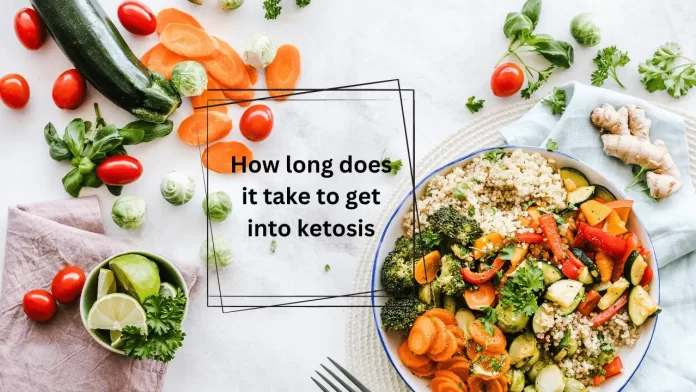Ketosis is a metabolic state in which the body burns stored fat for energy instead of carbohydrates. It is achieved by following a low-carbohydrate, high-fat diet, also known as the ketogenic diet. Ketosis has become a popular topic of discussion in the health and wellness industry due to its potential benefits, such as weight loss, improved insulin sensitivity, and increased energy levels.
However, many people wonder how long does it take to get into ketosis and what factors can affect the timeframe. In this article, we will explore the process of entering ketosis, the factors that can influence the time it takes, and some tips for getting into ketosis faster.
What is ketosis?
Ketosis is a metabolic state in which the body starts burning stored fat for energy instead of carbohydrates. When carbohydrates are limited or absent, the body uses its stored glucose (sugar) as a source of energy. Once the stored glucose is depleted, the liver begins to produce ketones from stored fats, which are used as an alternative energy source by the body. Ketones are produced by the liver when fat is broken down, and they can provide energy for the brain and body. This metabolic state is achieved by following a low-carbohydrate, high-fat diet, such as the ketogenic diet.
What is the ketosis diet?
The ketosis diet, also known as the ketogenic diet, is a low-carbohydrate, high-fat diet that is designed to promote the metabolic state of ketosis. The diet typically involves reducing carbohydrate intake to less than 50 grams per day and increasing fat intake to about 70-75% of daily calories, with the remaining calories coming from protein. By restricting carbohydrates, the body is forced to use stored fat as a primary source of energy, which can lead to weight loss.
The diet typically includes foods such as meats, fish, eggs, dairy products, nuts, seeds, healthy fats like olive oil and avocado, and non-starchy vegetables like leafy greens. The ketogenic diet has been shown to have potential benefits for weight loss, improving blood sugar control in people with type 2 diabetes, and reducing seizures in some people with epilepsy.
Foods that get you into ketosis fast?
To get into ketosis quickly, it is important to limit carbohydrate intake and increase fat consumption. Here are some foods that can help you get into ketosis faster:
Meat: Beef, pork, chicken, and other meats are excellent sources of protein and healthy fats, making them ideal for a ketogenic diet.
Fish and seafood: Fatty fish like salmon, tuna, and mackerel are rich in omega-3 fatty acids and can help promote ketosis.
Eggs: Eggs are high in protein and healthy fats, making them a great addition to a ketogenic diet.
Nuts and seeds: Almonds, macadamia nuts, walnuts, and chia seeds are all good sources of healthy fats and can help keep you in ketosis.
Avocado: Avocado is a great source of healthy fats and fiber, making it an ideal food for a ketogenic diet.
Cheese: Cheese is low in carbohydrates and high in fat, making it a great option for a ketogenic diet.
Coconut oil: Coconut oil is a rich source of medium-chain triglycerides (MCTs), which are quickly converted into ketones by the liver and can help promote ketosis.
Low-carb vegetables: Non-starchy vegetables like spinach, broccoli, and cauliflower are low in carbohydrates and can be consumed in moderate amounts on a ketogenic diet.
How Long Does It Take to Get into Ketosis?
The time it takes to enter ketosis varies from person to person, and it depends on several factors such as individual metabolism, diet, and activity level. Generally, it takes about 2-4 days of following a ketogenic diet to enter ketosis. However, some people may take longer, up to a week or more.
Ketosis Symptoms and Side Effects
Below is a table outlining some common symptoms and side effects of ketosis:
| Symptom/Side Effect | Description |
| Ketosis breath | A fruity odor on the breath caused by elevated ketone levels |
| Keto flu | Flu-like symptoms, including fatigue, headache, dizziness, and nausea, that can occur during the initial stages of ketosis |
| Digestive issues | Constipation, diarrhea, and other digestive issues may occur due to changes in dietary habits |
| Electrolyte imbalance | Reduced carbohydrate intake can lead to electrolyte imbalances, which can cause muscle cramps, headaches, and other symptoms |
| Insomnia | Some people may experience difficulty sleeping or changes in sleep patterns during ketosis |
| Decreased athletic performance | During the initial stages of ketosis, some people may experience a decrease in athletic performance due to changes in fuel sources
It is important to note that not everyone will experience these symptoms or side effects, and they are typically temporary and subside over time. It is also important to ensure that you are getting adequate nutrition, including electrolytes, when following a ketogenic diet. If you are experiencing severe or persistent symptoms, it is important to consult a healthcare professional. |
What are the benefits of ketosis?
Ketosis, the metabolic state in which the body uses stored fat for energy instead of carbohydrates, has several potential benefits. Here are some of the benefits of ketosis:
Weight loss:
Following a ketogenic diet can lead to weight loss, as the body burns stored fat for energy instead of carbohydrates.
Improved blood sugar control:
Ketogenic diets have been shown to improve blood sugar control in people with type 2 diabetes.
Reduced inflammation:
Some studies suggest that ketogenic diets may reduce inflammation, which can contribute to a range of health problems.
Improved mental clarity:
Some people report improved mental clarity and focus when following a ketogenic diet.
Reduced risk of heart disease:
Ketogenic diets may improve cholesterol and triglyceride levels, which can reduce the risk of heart disease.
Potential therapeutic benefits:
Ketogenic diets have been studied for their potential therapeutic benefits in conditions such as epilepsy, Alzheimer’s disease, and cancer.
Is the keto diet right for your body?
Whether or not the ketogenic diet is right for your body depends on several factors, including your health status, personal goals, and lifestyle preferences. While the keto diet can be beneficial for some people, it may not be appropriate or necessary for everyone.
How Much Sugar Can You Consume while on Keto?
The amount of sugar that can be consumed while on a ketogenic diet varies depending on individual goals and preferences. However, in general, the ketogenic diet involves a significant reduction in carbohydrate intake, including sugar.
To achieve and maintain a state of ketosis, it is recommended to limit daily carbohydrate intake to 20-50 grams per day. This includes both natural and added sugars. Many people on a ketogenic diet choose to eliminate added sugars entirely, while others may consume small amounts of natural sugars from sources such as berries or other low-carbohydrate fruits.
Frequently Asked Questions:
Q1: Can you eat dairy on a keto diet?
Ans: Yes, but it should be consumed in moderation.
Q2: How long does it take to see results on a keto diet?
Ans: Results vary, but some people see changes in as little as a few days to a week.
Q3: Can you cheat days on a keto diet?
Ans: It is not recommended as it can interrupt ketosis and hinder progress.
Q4: What are some common mistakes to avoid on a keto diet?
Ans: Not getting enough electrolytes, not tracking carbs, and not eating enough healthy fats.
Q5: Is the keto diet safe for long-term use?
Ans: The safety of long-term keto use is still being studied, but it may be safe for some individuals under proper supervision.



